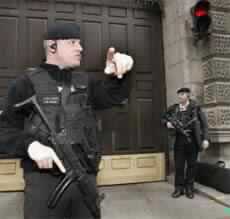- Author:
& Agencies - Section:
WORLD HEADLINES
Britain Toughens Anti-terrorism Laws

The British government announced tough new proposals to combat terrorism that would increase the period police can hold 'terrorist' suspects without charge from seven to 14 days. Also among the proposed amendments to Britain's anti-terrorism laws are maximum prison terms of two years for those convicted of driving licence or passport fraud, crimes which previously carried only fines.
In announcing the proposals, Home Secretary David Blunkett defended the government's decision to further toughen its anti-terrorist laws. The legislation was already strengthened following the September 11, 2001 attacks in the United States, drawing criticism from civil liberties groups.
"To close in on 'terrorists', the police increasingly need to analyse complex material," he said in a statement.
"In the course of an enquiry, they may need to examine computer hard disks, make multiple enquiries across different countries, or retrieve dangerous substances for forensic analysis. While the seven-day window for the investigation of terrorist suspects is often enough, in exceptional or complex cases the police may need more time.
But he also acknowledged that "this important power needs appropriate scrutiny, and only a court may grant an extension to the period of detention without charge."
Under the proposals, to be debated in parliament on May 20, police can only ask a court to extend the detention time after the seven-day period has expired.
Concerning the proposed prison terms for identity documents fraud, Blunkett said "passport and driving licence fraud are gateway offences to organised crime and terrorism. Our legislation must keep pace with increasingly sophisticated criminals and complex crimes. The police must have the powers they need to do their job and protect the public."
Under the proposed measures, police would be allowed to arrest anyone they suspect of possessing fake identity documents. Under current legislation, they are released to appear in court at a later date.
"These amendments send out a strong signal that terrorists and criminals cannot use identity fraud as a route to more serious crimes," said Home Office Minister Charles Falconer.
But the human rights group Liberty immediately denounced the measures as "ill-considered, unnecessary and politically motivated.
"There seems to be no end to this government's tendency to rush through ever more draconian powers in order to appear 'tough on terror'," said the head of Liberty, Mark Littlewood.
After the September 11 attacks, when the government raised the maximum detention period to seven days without charge, "the government gave absolutely no indication that they believed the period should be extended.
"The sensible way to combat terrorism is to ensure our security and intelligence services become sharper and better focused," he said.
**PHOTO CAPTION***
British anti-terror police guard a high-profile trial earlier this year. The government has proposed giving police tougher powers to combat terrorism. (AFP)


 Home
Home Discover Islam
Discover Islam Quran Recitations
Quran Recitations Lectures
Lectures
 Fatwa
Fatwa Articles
Articles Fiqh
Fiqh E-Books
E-Books Boys & Girls
Boys & Girls  Women
Women









